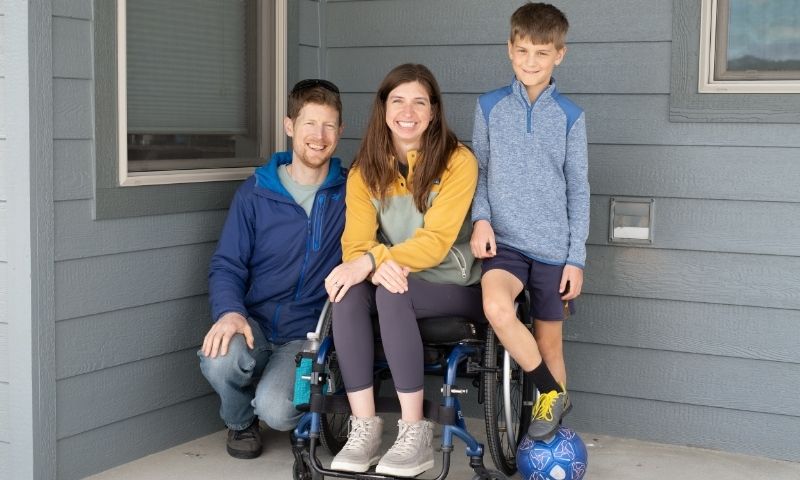Ableism Workshop Advocates for Disability Inclusion in Nursing
Nurse, educator, and consultant Vanessa Cameron spoke to the Duke University School of Nursing community about the impact of ableism in nursing and the need for disability representation.

Vanessa Cameron, MSN, RN, NPD-BC, CEN, CNL, gave a series of presentations on ableism in nursing and healthcare while visiting Duke University School of Nursing. Speaking to student, faculty, and staff audiences, Cameron drew on her lived experience as a disabled nurse and her hopes of transforming the profession to better serve people with disabilities.
Cameron is an educator and consultant with extensive experience in promoting inclusive learning environments and advocating for greater disability representation in healthcare. She has 13 years of experience in nursing and is currently working toward a PhD from George Washington University. The working title of her dissertation is “Workplace Inclusion for Nurses with Permanent Physical Disabilities: A Phenomenological Study Exploring the Intersectionality of Disability, Bias, and Advocacy.”
A few years ago, Cameron was leading the professional development and transition to practice/specialty program in an emergency department when she broke her back while rock-climbing. She returned to her nursing practice and professional development specialty while using a wheelchair, which has made her more knowledgeable about barriers to access but also more of an advocate for creating accessible spaces where disabled patients as well as healthcare professionals can thrive.
“I am motivated by my own personal experiences as a disabled nurse, and more specifically by the lack of awareness about disability, ableism, and the impact that I had as a nurse prior to becoming disabled myself,” said Cameron. “I was heavily engrained in diversity, equity, and inclusion (DEI) work, and very intentionally involved in creating health and workforce equity, yet disability was not a part of any discussions had at local, regional, or national levels.”
In a presentation given to Dr. Amie Koch’s N389 Health & Wellness class, Cameron said that the disabled community is the largest minoritized group in the world. “Everyone can and likely will be affected by disability,” she added.
Cameron also said that 32% of adults in North Carolina have a disability, which is higher than the 27% national average.
Cameron said that access, quality, and cost of healthcare are all factors that lead to health disparities for people with disabilities, who are at greater risk for depression, heart disease, long COVID, and poor cancer outcomes, for example. According to Cameron, disability representation in nursing is a significant potential driver in improving the quality of healthcare.
In order to improve outcomes, Cameron argued, the nursing profession needs greater retention of disabled nurses and more accessible entry to practice. In addition to more physically accessible spaces, a culture shift is also imperative.
“There’s this idea that nurses must be super-human, or heroes. It’s the ‘badge of honor’ for skipping breaks, working doubles, and neglecting self-care while on the job,” said Cameron. “These become unspoken expectations within nursing work culture, and often disabled nurses are not able to sustain that level of self-neglect. It is harmful, long-term, to all nurses but often impacts disabled nurses more quickly and intensely.”
“This adds to the nursing shortage problem,” Cameron added. “It feels easier to retire than to ask for help or accommodations as a nurse.”
Speaking to primarily non-disabled audiences, Cameron emphasized that everyone can be part of this culture shift. She encouraged self-reflection, curiosity over judgment, and the importance of looking at the benefits the come with disability and not just the barriers.
“In the roles I have had since becoming disabled, I feel as though I am more knowledgeable, more empathetic, and have greater advocacy skills and overall perspective, compared to my non-disabled self,” said Cameron. “This shows me that nurses with disabilities will not only be safe and capable, but will thrive as nurses, as long as they are provided opportunities, accommodations, and the support necessary to create equity and belonging.”
According to Cameron, future nurses can work against ableism by consistently reminding themselves that they are working with whole, multifaceted human beings, and by not making assumptions about goals and abilities. This will enable them to see disability not as a liability, but as a human condition and a potential asset.
Speaking to her own multifaceted life, Cameron said, “I am also a real person, with challenges, flaws, and other passions. I am an avid reader, a Swiftie, and enjoy adaptive mountain biking and Nordic skiing with my family.”
“The person who has taught me the most about my disability and my capacity to remain whole is my child, who was almost 7 when I became disabled and is now 10. He shows constant support and patience, reminds me that I can still do all the important things as a parent, and provides unconditional love—even on my hardest days. If we could all look at disability like children, with curiosity and seeking the good, ableism in healthcare wouldn’t exist.”
Cameron’s visit was hosted by the School of Nursing’s Institute for Educational Excellence and Office of Diversity Equity, Inclusion, and Belonging.